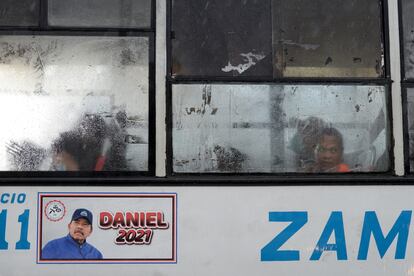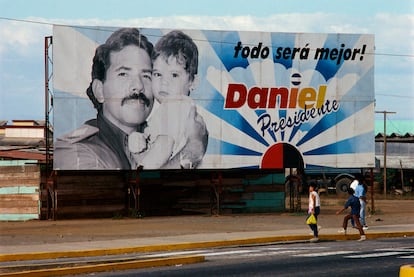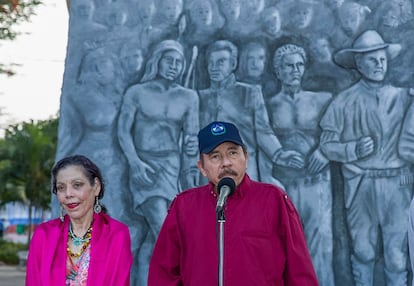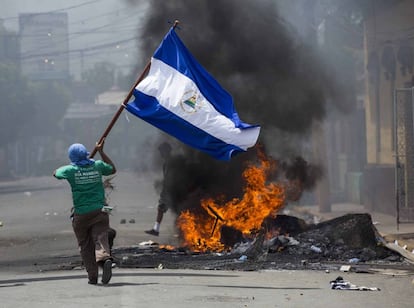Nicaragua, the ‘gulag’ of Central America
The country is experiencing days of terror. The regime of Daniel Ortega and Rosario Murillo has orchestrated the arrests of politicians, journalists, activists and former Sandinista leaders in a bid to retain power with elections due in November

On midday on June 2, under the suffocating heat of Managua, a group of police officers arrived at the door of presidential pre-candidate Cristiana Chamorro. Until that day she had been the most recognizable and popular face among a fed-up and impoverished population who barely knew the names of the other candidates but who had sent Chamorro to the top of the polls to replace Daniel Ortega in the November elections. A Gallup survey also placed Ortega’s popularity rating at 20%, one of the lowest on the continent. A large part of Chamorro’s rise is due to voters identifying with her mother, Doña Violeta - as everybody in Nicaragua from taxi drivers to ministers refers to the former president, Violeta Chamorro, who governed from 1990 to 1996.
The police entered her house, went through drawers, moved closets, searched every room and after five hours placed her under house arrest, confiscating any means of communication with the outside world: telephones, an iPad, her laptop. Chamorro was the first to receive such a visit. Three days later it was another presidential hopeful, Arturo Cruz. Two days afterward another candidate. Then followed a banker, a journalist, another pre-candidate, a feminist and, last Friday, Pedro Joaquín Chamorro.
Between June 4 and 26, Sandinismo’s “month of the long knives” witnessed the arrests of 21 people, among them five presidential hopefuls, eight opposition political leaders and two businessmen. In a stroke, Ortega had silenced the voice of criticism in the country. “He wanted to eliminate any kind of leadership,” said journalist Carlos Fernando Chamorro, the brother of one of the detainees. In this wave of repression Ortega had no hesitation in brushing aside the last figureheads of the Sandinista movement that once enchanted the world: Dora María Téllez, Comandante Dos, and General Hugo Torres, Comandante Uno.

It was called Operación Chanchera, because of the amount of chanchos (pigs) housed in the Palacio Nacional in Managua and the events were recorded by Nobel Laureate Gabriel García Márquez, who described the mission as “magisterial insanity.” Twenty-five guerrillas thumbed their nose at a security detail consisting of 3,000 men spread around Congress and several ministries. Torres and Téllez were joined by Edén Pastora, Comandante Cero, and succeeded in freeing 60 political prisoners who were able to flee into exile in 1978, among them Tomás Borge.
Before General Torres was dragged from his house two weeks ago, he recorded a video that sums up the recent history of Nicaragua. “I risked my life to get Ortega out of jail, but these are the swings and roundabouts of life: those who once held principles today have betrayed them.” Saturn devoured his children and Sandinismo has passed from history to the trash can.
Fear means looking both ways when you leave home, living with a police patrol at the door, peering out of the window constantly, avoiding WhatsApp, changing meeting places several times or answering the phone in monosyllables. Unlike the disturbances of 2018, when the rioters, the barricades, the students and the dead were in the street, on this occasion terror is a silent virus stalking Managua. It is the fear of the phone buzzing with an unexpected message at night, because the vast majority of arrests take place after the sun has set. It is being glued to Twitter, using Signal software, or waving a blue and white flag in the wrong place at the wrong time. Fear in Nicaragua in 2021 is summed up in four words used by all of the people approached for this article: “Please, don’t quote me.”

Nicaragua’s rupture is not a matter of political elites being played out on social media. After the student rising of 2018 and the subsequent failure of peace talks, Ortega set a steamroller in motion that reaches down to the humblest rungs of the ladder: for example, a migrant in a caravan. The Sandinista version of peace imposed in 2018 first delivered death and over the next three years extended the mantle of vengeance to the extent that it provoked the exile of 100,000 Nicaraguans in Costa Rica, another 50,000 in other countries, thousands of asylum requests in Mexico and the United States and ever-larger migrant caravans seeking a new life elsewhere. Thousands of young people were expelled from university and sought refuge in the country’s interior, others had their academic records expunged and many more will never find work due to their involvement in the protests. To counter the “coup d’état,” the government handed sweeping powers to the Citizens’ Councils (CPC), created in the image of the Cuban Committees for the Defense of the Revolution to facilitate neighborhood spying.
After winning a war, electoral defeat in 1990 left Daniel Ortega with a bitter sensation of “betrayal by the people,” according to journalist Fabian Medina, author of the book El preso 198 (Prisoner 198), the finest profile of Ortega in print. After his return to power in 2006, all of Ortega’s energy has been focused on ensuring history does not repeat itself: first he won a rigged election by lowering the threshold of votes needed to become president, then he approved changes to the constitutional term limit and finally ushered in an indefinite presidency. During his conversion he renounced the red and black of the Sandinista guerrillas and embraced the pastel pink of social democracy, substituting speeches by Lenin for songs by John Lennon. The following 10 years were marked by a relative calm during which Ortega and his wife and vice-president, Rosario Murillo, pulled the strings of the National Assembly at will, dismantling institutions and building up an army on whim.
During that time the Venezuelan palm greased revolutionary discourse with $5 billion per year, courtesy of the exchange of petroleum for food, while the large corporations enjoyed a golden age in which they were permitted to do business as long as they didn’t get involved in politics. Last December, while the world was engaged in the fight against the coronavirus pandemic, the totalitarian framework was consolidated by the passing of various laws, among them the Law for the Defense of the Rights of the People, or Law 1055, which allows the authorities to pursue anybody for “actions that undermine the independence, sovereignty or self-determination” of the country. Included in this legislation is the surreal crime of “exalting of applauding the imposition of sanctions” against Nicaragua. Another law dealing with cyber-security allows for the jailing of journalists.

All of this has paradoxically allowed the Public Prosecutor to accuse General Torres, who risked his life for his homeland, of being a traitor to his country. It has also forced Wilfredo Miranda, an EL PAÍS contributor in Managua, to go underground after being accused of cyber-espionage for filing his articles via an old cellphone. Cristiana Chamorro has also been accused of money laundering as part of an attempt to prevent her from running and to besmirch the legacy of her family: integrity. In other cases, detainees have been moved to prisons after being effectively jailed at home, says Berta Valle, the wife of presidential pre-candidate Félix Maradiaga. “He has been under de facto house arrest for months. He cannot campaign or travel because as soon as he leaves the house the police are on top of him. On December 17 they forced him back into the house and broke his fingers.”
Dictators of pensionable age do not use social media or publish press bulletins. They make their opinions known when there is a historical reason for doing so and not because public opinion demands it. Cuba’s Fidel Castro used the October 1 celebrations to lay out his affinities and phobias from the platform of anti-imperialism, and Spain’s Francisco Franco used to make his announcements on July 18, the anniversary of the military coup. Daniel Ortega is no different and after a month of silence he appeared on June 23 to mark the 85th anniversary of the birth of Carlos Fonseca, the founder of the Sandinista National Liberation Front.
There was scarcely anyone in attendance but Ortega and Murillo slowly did the rounds, greeting members of their security cordon as through they were supporters while the television cameras produced canned applause and cheering. He advanced with small steps through the mausoleum while she moved the 10 rings on her finger to conduct the rhythm of the adulation. When they arrived at Fonseca’s tomb, a version of Comandante Carlos Fonseca by the Mejía Godoy brothers rang out, despite their repeated requests that Ortega stop using their music.
For just over an hour, Ortega took to the microphone to criticize US imperialism and its designs to dominate the continent, and also to accuse the Organization of American States (OAS) of meddling in Bolivia’s affairs. He also asked that smaller nations like Nicaragua be permitted to have nuclear arsenals. When he referenced the wave of recent arrests, he said the detainees weren’t even presidential candidates (officially they are pre-candidates) and that “everything had been carried out in accordance with the law” after a previous investigation, “in the same way a drug trafficker is tried.”
“Not a step backwards,” he concluded in front of the tomb of his old friend and comrade. The event was broadcast on Facebook and at the height of proceedings 50 people were watching, 49 of whom were probably journalists waiting for the first public comment on the arrests. When the event ended Ortega made his way to a waiting Mercedes with the hesitant steps of an old man. His wife had left earlier and darkness had fallen. Those employed at the mausoleum returned to the official coach in which they had arrived and the opposition were left to anxiously watch their cellphones.

In April 2018, after a month of bloody repression against students that left almost 400 people dead, many of them with a bullet in the nape of the neck and the temple, a young man named Lesther Alemán, draped in the blue-and-white flag of Nicaragua, stood up in front of Ortega and shouted: “In less than a month you have done things we could never have imagined. We cannot hold talks with an assassin who has committed genocide. End the repression.” The 20-year-old said in front of the television cameras what people had been shouting in the streets across the country: “Ortega and Somoza, they are the same thing.” Since then, Lesther Alemán has been in hiding. He has not seen his family for over a year and agreed to talk to EL PAÍS from an undisclosed location. “Ortega is seeking to destroy the electoral process in November with these arrests. He wants to do everything possible to suffocate the opposition and cause them to withdraw. Then he will say that they were the ones who did not wish to participate and he’ll have an open path to a fourth term.” According to this young man, “there is a fear within Sandinismo at seeing power slip from their grasp and they have fallen back on persecution and terror to achieve the highest possible level of abstention if there are elections.”
The international community has set its wheels in motion in the face of the crisis in Nicaragua with little success. Several sources consulted concur that the day after the OAS condemned Ortega over the detentions, a vote from which Mexico and Argentina abstained, representatives from those two countries attempted to mediate but found that neither Ortega or Murillo were willing to take their calls. When Spain called for a democratic process it was met with insults from within the Nicaraguan government, which has made it clear that it is only willing to talk to the United States: it was to Joe Biden that Ortega’s speech was directed.
Noted for their strategic agility, the doubt now lies in what is behind the suicidal gambit being employed by the presidential pair, which in the short term has levied isolation on Nicaragua and disregard toward the November elections on the part of the international community. According to Roger Guevara, a former Nicaraguan ambassador in Brussels and Caracas, faced with the collapse of Sandinismo, Ortega needs to have a collection of leaders in his power in order to be able to negotiate impunity. In Guevara’s view, Ortega and Murillo may be willing to cede the presidency in exchange for holding onto power in the Assembly, which would allow them to control finances, appointments and the matter of immunity. “In this way, the United States would endorse the arrival of another person and the crisis can be considered over. At the same time, they would retain a large amount of power as they would have access to the budget and influence in naming ministers and diplomats. It would be a de facto monarchy with the blessing of the United States.”
However, the journalist Carlos Fernando Chamorro believes this option, known as the “soft landing,” is a myth. “I think it is just speculation. This theory assumes that there are powers who are conversing with the dictatorship and negotiating for this or that with the goal of finding a peaceful path, but this has never been the case.” While analysts try to predict the future, the present is that of a country that started out as a García Márquez chronicle but has become like an Orwell novel, where the animals who rose up against tyranny end up running the farm.
English version by Rob Train.
Tu suscripción se está usando en otro dispositivo
¿Quieres añadir otro usuario a tu suscripción?
Si continúas leyendo en este dispositivo, no se podrá leer en el otro.
FlechaTu suscripción se está usando en otro dispositivo y solo puedes acceder a EL PAÍS desde un dispositivo a la vez.
Si quieres compartir tu cuenta, cambia tu suscripción a la modalidad Premium, así podrás añadir otro usuario. Cada uno accederá con su propia cuenta de email, lo que os permitirá personalizar vuestra experiencia en EL PAÍS.
¿Tienes una suscripción de empresa? Accede aquí para contratar más cuentas.
En el caso de no saber quién está usando tu cuenta, te recomendamos cambiar tu contraseña aquí.
Si decides continuar compartiendo tu cuenta, este mensaje se mostrará en tu dispositivo y en el de la otra persona que está usando tu cuenta de forma indefinida, afectando a tu experiencia de lectura. Puedes consultar aquí los términos y condiciones de la suscripción digital.









































